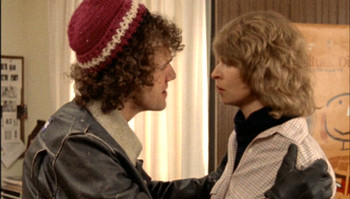Show of Commerce, Show of Art
For a series whose mystery and suspense are central to its allure, Lost’s ploy of eating up airtime minutes with background that is seemingly irrelevant to the central plot is positively brilliant. When you don’t need to move the story forward for a couple handfuls of your weekly forty-odd minutes, it makes it a lot easier to sustain the series over a longer period of time. And here’s the shocking thing: The backstory structure is an artistic triumph, a skeleton that gives the series its distinctive shape, depth, and resonance.

 You’re in your apartment. Your husband has gone to work. There’s a knock at the door. A genial man says he’s the plumber. You explain that you haven’t called for a plumber. He replies that he’s checking the pipes of all the apartments because of a pressure problem. You let him in; his story seems reasonable, and he’s got the right tools. It’s an act of trust. He says his name is Max.
You’re in your apartment. Your husband has gone to work. There’s a knock at the door. A genial man says he’s the plumber. You explain that you haven’t called for a plumber. He replies that he’s checking the pipes of all the apartments because of a pressure problem. You let him in; his story seems reasonable, and he’s got the right tools. It’s an act of trust. He says his name is Max.